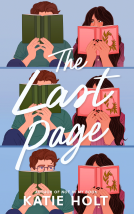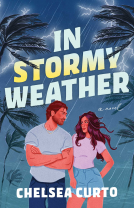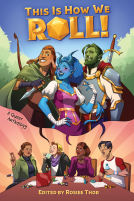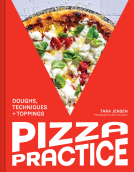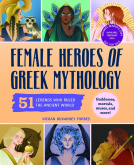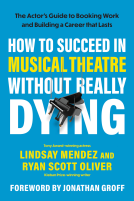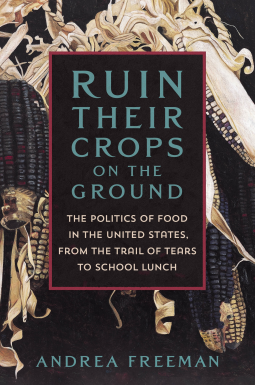
Ruin Their Crops on the Ground
The Politics of Food in the United States, from the Trail of Tears to School Lunch
by Andrea Freeman
This title was previously available on NetGalley and is now archived.
Send NetGalley books directly to your Kindle or Kindle app
1
To read on a Kindle or Kindle app, please add kindle@netgalley.com as an approved email address to receive files in your Amazon account. Click here for step-by-step instructions.
2
Also find your Kindle email address within your Amazon account, and enter it here.
Pub Date Jul 16 2024 | Archive Date Aug 09 2024
Henry Holt & Company | Metropolitan Books
Description
The first and definitive history of the use of food in United States law and politics as a weapon of conquest and control, a Fast Food Nation for the Black Lives Matter era
In 1779, to subjugate Indigenous nations, George Washington ordered his troops to “ruin their crops now in the ground and prevent their planting more.” Destroying harvests is just one way that the United States has used food as a political tool. Trying to prevent enslaved people from rising up, enslavers restricted their consumption, providing only enough to fuel labor. Since the Great Depression, school lunches have served as dumping grounds for unwanted agricultural surpluses.
From frybread to government cheese, Ruin Their Crops on the Ground draws on over fifteen years of research to argue that U.S. food law and policy have created and maintained racial and social inequality. In an epic, sweeping account, Andrea Freeman, who pioneered the term “food oppression,” moves from colonization to slavery to the Americanization of immigrant food culture, to the commodities supplied to Native reservations, to milk as a symbol of white supremacy. She traces the long-standing alliance between the government and food industries that have produced gaping racial health disparities, and she shows how these practices continue to this day, through the marketing of unhealthy goods that target marginalized communities, causing diabetes, high blood pressure, and premature death.
Ruin Their Crops on the Ground is a groundbreaking addition to the history and politics of food. It will permanently upend the notion that we freely and equally choose what we put on our plates.
Advance Praise
"Freeman takes a hard look at the history of America’s agriculture and food distribution policies and finds them riddled with political corruption, inefficiency, racism, classism, and greed."
—Booklist, Starred Review
"A sweeping, whistle-stop tour of U.S. history . . . Ripe with sharp analysis and fresh ideas . . . Readers will relish this piquant new perspective on America’s political relationship with food."
—Publishers Weekly, Starred Review
"A useful reminder that food can oppress, coerce, and undermine the bodies and aspirations of vulnerable minorities."
—Kirkus
"Ruin Their Crops on the Ground nourishes readers with jaw-dropping stories and revelatory data about the use of food as a tool of oppression. This passionate book enlightens and enrages. A glass of milk will never be the same."
—Paul Butler, author of Chokehold: Policing Black Men
"With superb research and a compelling narrative, Andrea Freeman has pulled back the curtain on this country's use of food as a tool in fostering racism, discrimination, and inequity."
—Michael Moss, author of Hooked: Food, Free Will, and How the Food Giants Exploit Our Addictions
"Ruin Their Crops on the Ground adds a critical yet overlooked dimension to the history of U.S. economic and racial oppression, exposing policies rooted in slavery and colonialism that have long targeted marginalized communities. Today, far from securing the nation's health, the government enriches corporations by subsidizing unhealthy food production while saddling disenfranchised groups with nutrition-related diseases and blame for their supposedly bad choices. This eye-opening book will change your view of food and its contribution to America's profound inequalities."
—Dorothy Roberts, author of Killing the Black Body
Available Editions
| EDITION | Other Format |
| ISBN | 9781250871046 |
| PRICE | $29.99 (USD) |
| PAGES | 256 |
Links
Available on NetGalley
Average rating from 24 members
Featured Reviews
 Sara N, Reviewer
Sara N, Reviewer
In the most respectful way, reading this book felt like when a friend sits down in front of you and is like "are you ready to hear some BULLSHIT?" and you're all ohhhh let's go and then they proceed to incisively detail exactly how and why some situation is complete and total wretched nonsense such that if situations would able to feel emotions the whole shebang would be left a shriveled up humiliated mess by the end of it. And it is GREAT.
Absolute fury at each of these injustices undergirds every chapter of this book ending in a positively delicious excoriation of the US government and the Supreme Court in particular. If you're picking up this book you probably already know that the whole US food system is on some fucked up shit (example: student lunch debt...exists), but Andrea Freeman makes it clear that girl, you don't even know. I learned a hell of a lot, I got super mad, I spent some time brooding about how everyone in the whole government needs to be strapped down and made to read this and acknowledge what they've done and fix ittttt. Because yikes, man.
This book is sourced to hell and back btw, so if you pick it up thinking it's very, very long, that is a trick - the book ended for me at 59% and the remaining whole 2/5ths of it was footnotes. The length is actually perfect. Fantastic work all around.
My thanks to Henry Holt & Company and NetGalley for the ARC.
Readers who liked this book also liked:
Lindsay Mendez; Ryan Scott Oliver
Arts & Photography, Business, Leadership, Finance, Nonfiction (Adult)

